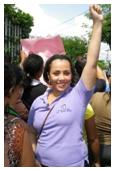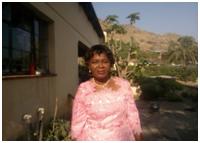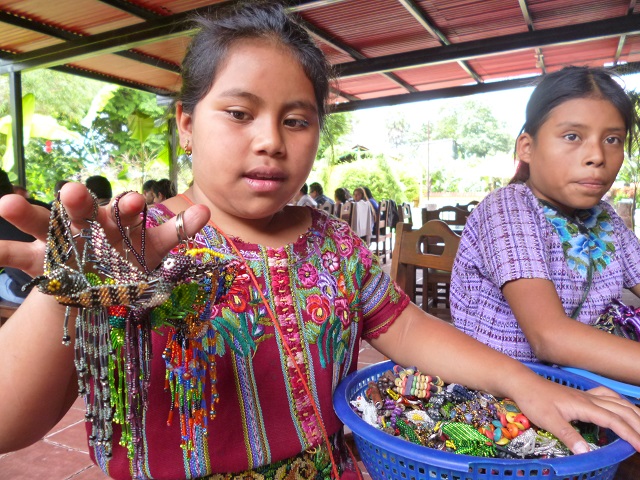The marginal among the invisible: women in the informal economy organized by Central America Women’s Network (free entry, 6pm in the gallery cafe) Building solidarity between continents
Speakers:
 Patricia Estrada, Movement of Working and Unemployed Women Maria Elena Cuadra (MEC)
Patricia Estrada, Movement of Working and Unemployed Women Maria Elena Cuadra (MEC)
Faith Shaba, Malawian Union of Informal Workers (MUFIS)
The speakers will share their experience of organising women domestic workers, street vendors and home-based workers and to tell us why supporting them should be a priority for those concerned about development, labour rights and gender and economic justice.
When we think about employment we generally focus on formal jobs, making millions of workers invisible. Many workers are self-employed in small unregistered businesses and also wage-earners in cleaning, catering, commerce and other sectors of the informal economy, where economic activities are not regulated nor protected by the State.
As unjust trade regimes and structural adjustment become commonplace the dimension of the informal economy is growing across the globe, including in the UK and other European countries. In countries in sub-Saharan Africa, the informal economy can be as high as 90% of the total workforce. Women are overrepresented among workers with non-standard employment arrangements and have indeed joined the informal economy in large numbers.
In early November women leaders from the Nicaraguan Movement of Working and Unemployed Women Maria Elena Cuadra (MEC) and from the Malawian Union for the Informal Sector (MUFIS) are touring the UK to share their experience of organising women domestic workers, street vendors and home-based workers and to tell us why supporting them should be a priority for those concerned about development, labour rights and gender and economic justice.
 Faith Shaba works as a street vendor from Blantyre, Malawi. She makes a living selling clothes, for which she travels across various t Malawian provinces. Faith joined the Malawian Union of Informal Workers (MUFIS) in 2011, where she is active in the women’s committee as well as in the organization’s own micro-credit initiative.
Faith Shaba works as a street vendor from Blantyre, Malawi. She makes a living selling clothes, for which she travels across various t Malawian provinces. Faith joined the Malawian Union of Informal Workers (MUFIS) in 2011, where she is active in the women’s committee as well as in the organization’s own micro-credit initiative.
Unfortunately, the visa application of Faith Shaba, of the Malawian Union of Informal Workers (MUFIS) has been rejected. This means she won’t be able to join us for this discussion on Saturday.
A passionate advocate of women’s rights, Faith denounces how women working as street vendors in Southern Africa are unaware of their rights and are harassed and abused by council officials, police and other vendors alike.
“Street vending is biased towards men. Lending institutions for instance favour men, who get loans and equipment much more easily, whereas women are asked for extensive evidence of their ability to repay.” With MUFIS Faith works to raise awareness of these issues among other male and female unionists and to build a culture of respect for women’s rights among street vendors.
MUFIS was established in 2001 to represent the growing numbers of informal economy workers, which now stands at 88% of the active population. Working together with existing street vendor and market trader organisations, it aims to provide a national platform for informal economy workers to raise their concerns to government authorities. MUFIS also trains members in leadership and business ventures and fights for the right to the city.
Patricia Estrada lives in Chichigalpa, a town close to Managua (capital of Nicaragua), which houses the Headquarters of the Movement of Working and Unemployed Women Maria Elena Cuadra (MEC) .
She joined MEC as an outreach and advocacy worker in 1998, when she was 14 years old. Patricia has now extensive experience as an advocate for the rights of women working informal sector and has expanded MEC’s networks and membership with hundreds of street vendors, market traders, domestic workers, entrepreneurs and rural workers.
She delivers trainings for women on issues of gender, economic literacy gender budgeting, human and labour rights and sexual and reproductive rights, and supports member as a paralegal in the defence and promotion of their rights.
MEC was established in 1994 and today has a membership of more than 70,000 women in seven Departments of Nicaragua, including maquila factories workers, small entrepreneurs, rural women, women working in the informal economy and unemployed women. MEC works to improve the quality of life of working and unemployed women in the poorest sectors of Nicaragua and fights for women’s equality and in defence of their rights as women, workers and mothers.


